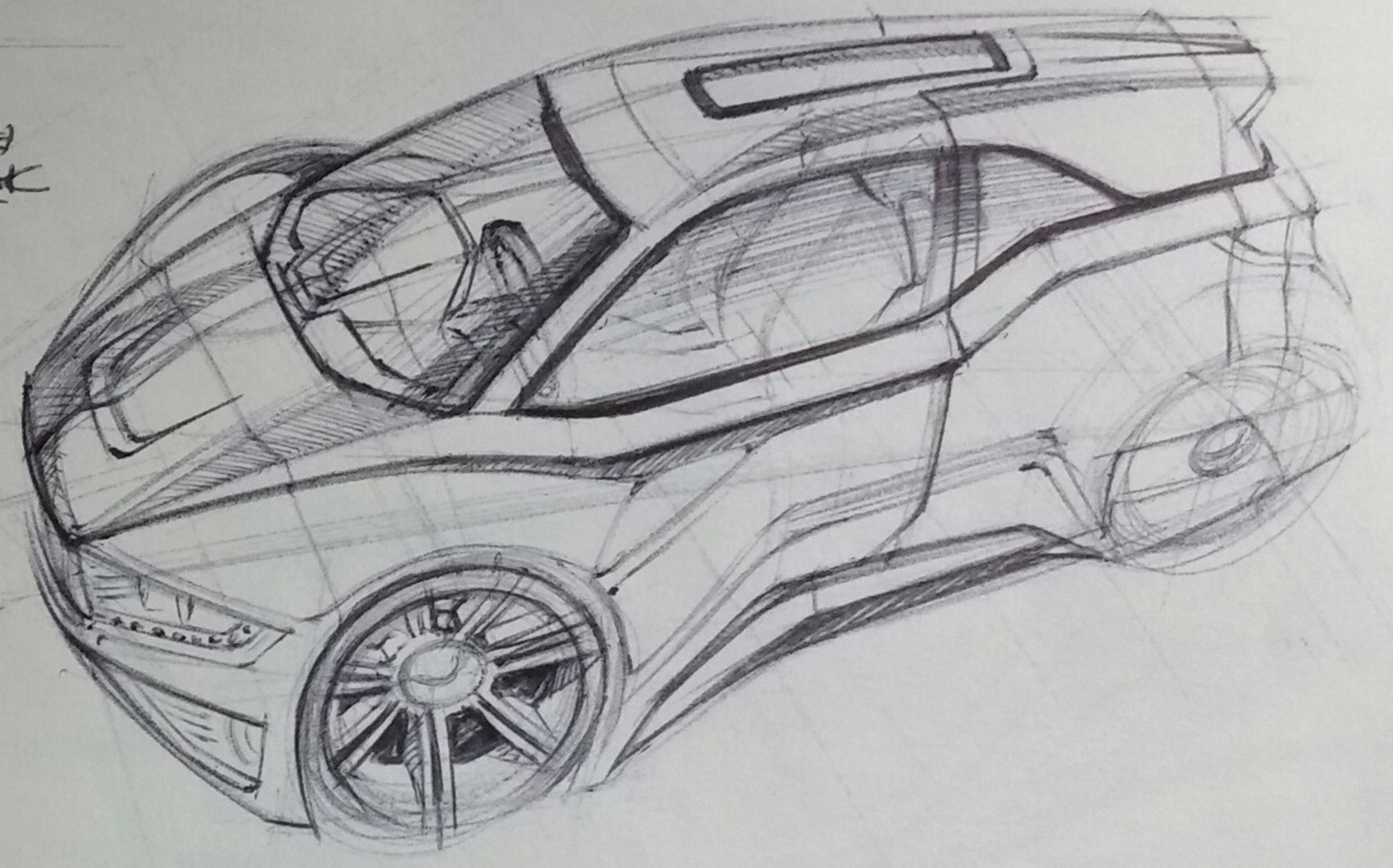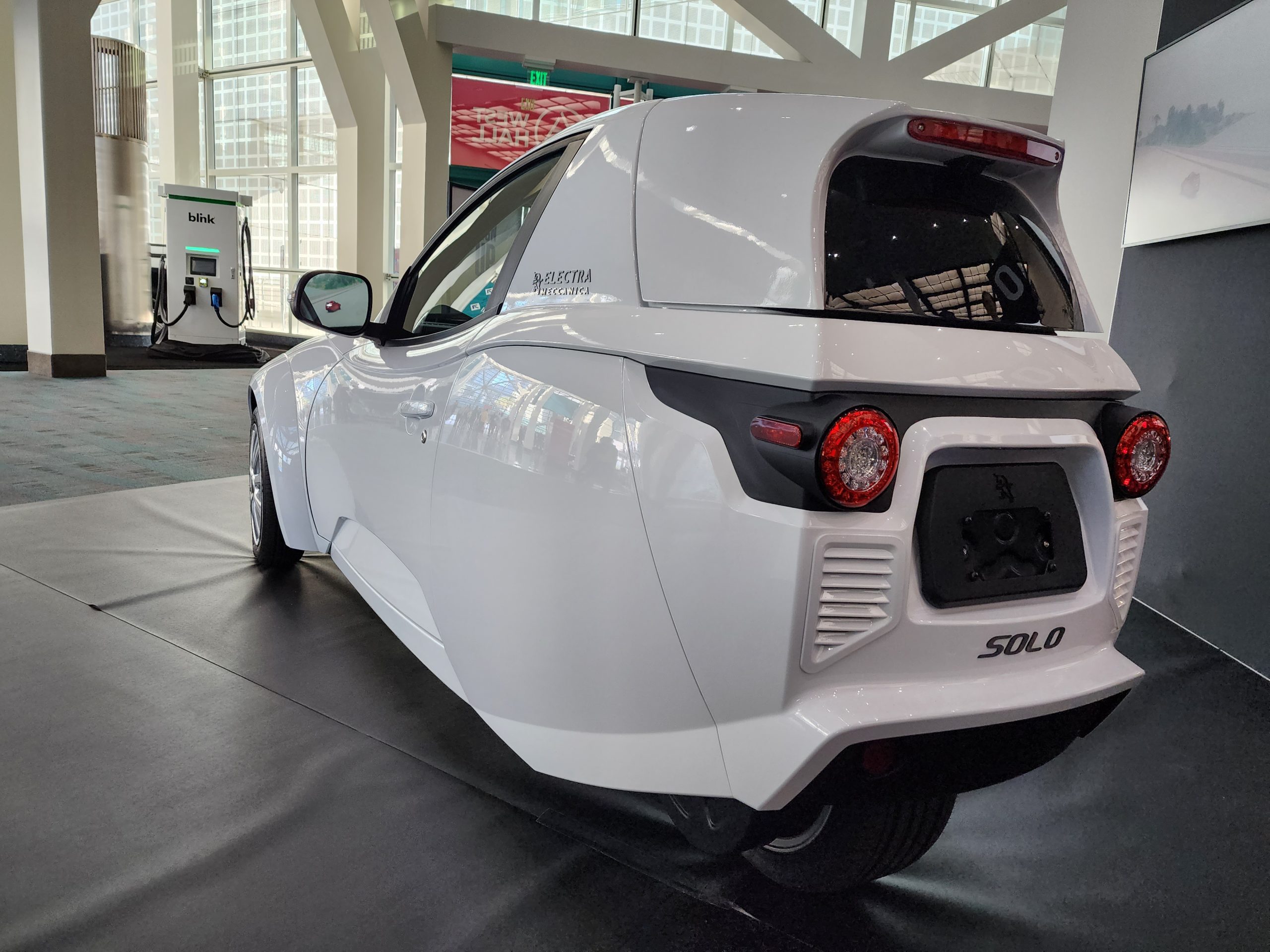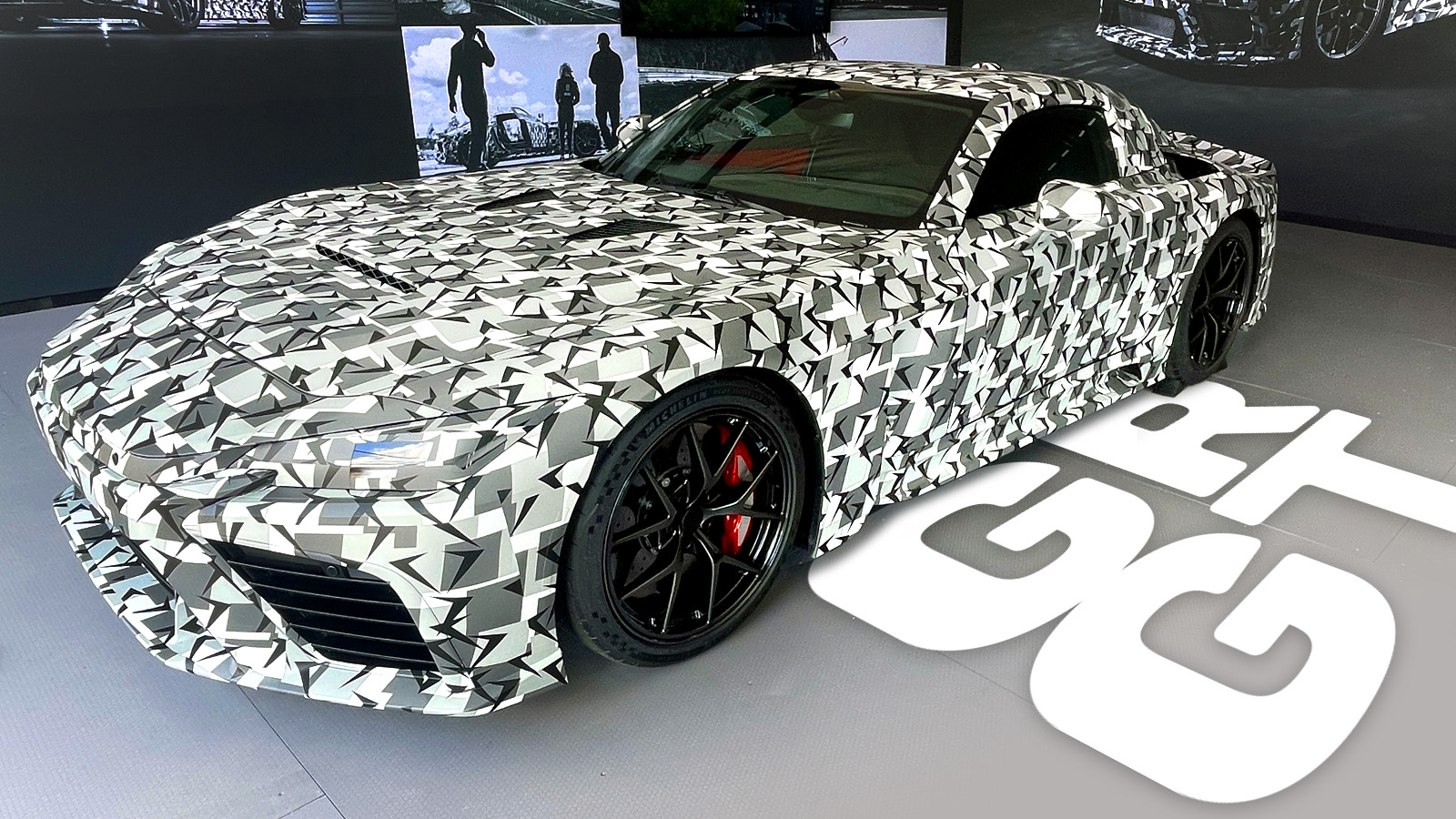Day by day, month by month, year by year, car buyers in America are getting more and more choices for EVs. There seems to be an EV for everyone, from motorcyclists to lovers of big and chunky SUVs. This weekend at the 2022 Los Angeles Auto Show, I got to drive an EV meant for the minimalist. The ElectraMeccanica Solo is one of the cheapest highway-legal EVs in America, and it’s a single seater that gives you nothing more than you need.
The past seven days have brought a number of firsts for me. On Friday, I flew into Los Angeles aboard a Boeing 777-200. It wasn’t just my first time in a 777, but my first time riding in a wide-body aircraft of any kind. While here, I’ve gotten more firsts like my first time at the Petersen Automotive Museum, first time at the LA Auto Show, and first time in Pasadena. On the way to the LA Auto Show, I saw another first: an ElectraMeccanica Solo on LA’s freeways. Seeing that Solo on the highway is perhaps my biggest surprise of the whole show.
Where The Solo Came From

I was surprised because I’ve known about and seen pictures of the ElectraMeccanica Solo for a while, but production always seemed to be off in the near future. The story of ElectraMeccanica technically starts in 1959 in Italy with a different company, Intermeccanica. Founded by Frank Reisner, Intermeccanica was–and still is–a tuning shop, making go-fast parts for Renaults, Simcas, Peugeots, and more. Later, Intermeccanica got into coachbuilding and crafting bodies for projects like the Apollo GT sports car, the Italia, the Indra, and more. Intermeccanica also got into making Porsche 356 replicas. Reisner died in 2001, and his son Henry took over. Today, Intermeccanica continues its tradition of custom-built cars, and you can still buy a handcrafted Porsche replica from the company.
Along the way, Henry Reisner decided to open up another venture. As Automotive News Canada reports, in 2012, Reisner joined forces with Jerry Kroll to create ElectraMeccanica. This venture wouldn’t involve coachbuilding or replicas, but instead focus on building a three-wheeler. Kroll, as tech business site Seeking Alpha writes, has a long history of launching and being involved in various startups.

But the experience perhaps most related to ElectraMeccanica is the fact that Kroll had been involved with the Corbin Sparrow (above), a three-wheeler first built in 1999. At one point he even ran Corbin Motors Vancouver. In 2015, Kroll purchased the rights to the Corbin Sparrow, and while the ElectraMeccanica Sparrow looked pretty much the same as the Sparrow did in 1999, the new version ditched the lead-acid batteries for lithium. The plan, as Canadian car publication Driving.ca wrote, was to produce a handful of Sparrows before shoving the drivetrain into a sleeker body. Kroll touted his company’s EV as the new people’s car:
“This is the Volkswagen Beetle for the 21st century,” Jerry Kroll declared in the Westin-Bayshore parking lot during my pre-test drive briefing. “After 30 minutes of driving it, you feel like you are wearing Robert Downey Jr.’s Ironman suit. You’re wearing the car. It’s the way driving should be.”
In a video, Kroll went even further, saying the Solo would end up “as ubiquitous as the iPhone within a year” and calling it the best experience that you could have that isn’t sex. But what wasn’t happening were deliveries, and after those 2015 teasers of the production version and tens of thousands of pre-orders, sites began to doubt whether the cars would ever reach customer hands.
ElectraMeccanica Pulls It Off

I am happy to say that the ElectraMeccanica Solo is not vaporware and the company actually pulled it off! At least, to some extent. Before I continue, I should note that the marketing strategy for the Solo has changed. Kroll was replaced as CEO by Kevin Pavlov, and the marketing strategy has dialed back far from calling it the 21st Century Beetle or as present as an iPhone. Instead, ElectraMeccanica today is more reasonable, touting the Solo as an inexpensive electric commuter that’s also fun.
I started my journey with the Solo by climbing around it and feeling the little three-wheeler up. The Solo’s configuration is that of a reverse trike. A single, belt-driven rear wheel propels the vehicle, while two front wheels do the rest of the work. In my experience, this is a stable configuration. It doesn’t feel tippy or like you’re going to lose grip while doing spirited driving. And that rear wheel is far enough back and thick enough that you don’t feel like it’s going to swap ends, either.

The exterior design does come with some touches similar to that of the Sparrow, like the tapering rear end and a headlight placed centrally below the windshield.
But unlike the Sparrow, this design is fresh and doesn’t look like a suppository. Though, from certain angles it does look like a car that was cut in half, which makes me smile. Overall fit and finish on the exterior is good, with everything feeling like it belongs on a motor vehicle that will be exposed to the elements. I love the badging, too, though you’ll probably notice the orange peel in the paint.

The first thing that you’ll notice when opening one of the doors is just how big the sills are. That’s because the vehicle’s batteries are under those sills. Getting in involves either crouching in like you’re getting into a sports car, or sitting down backward, then rotating yourself in. I preferred doing the former.

Inside, you’re greeted by a surprisingly roomy interior. At 10.1 feet-long, it’s a little over a foot longer than a Smart Fortwo. This results in an interior with a lot of space for you to spread out. You also get a small frunk and a small trunk, so you could carry some gear with you, too.


Looking forward, this interior appears to be a parts bin special. I feel like I’ve seen all of these bits and pieces in many other vehicles before, and the radio is something that you’d find at your local Best Buy. But that’s fine, because making a bespoke interior for a vehicle like this seems like it would be a waste of resources. Vehicles like these sort of should be a parts bin puzzle. As far as quality goes, everything in here feels no worse than, say, a mid-2000s General Motors product. Which again, I’m fine with for a vehicle like this.

The features list is pretty stacked, too. You get air-conditioning, a heated seat, big heated side mirrors (no rearview mirror), keyless entry, and a reasonably comfy seat. Hopping in and closing the door, I started pretending that I was a character in Top Gun, and I was about to go tear up the sky. I do wish that the interior design embraced the cockpit feel a bit more, but I still dig it.
Going Solo

As a motorcyclist, one of the things that I wanted to find out about the Solo was if it drove like a car, or handled like a motorcycle. Three-wheelers walk an interesting line. Trikes like Can-Ams feel like motorcycles with an extra wheel, while something like a Vanderhall should feel like a car that’s missing a wheel.
On paper, the Solo is like a Japanese Kei Car. It weighs 1,769 pounds, is powered by a 56 HP, 103 lb-ft torque electric motor, and has a top speed hovering around 80 mph. Those are very much Kei Car specs, but for sale here in America. If you think that weight is porky, ElectraMeccanica tells me it’s because of those batteries. The engineer on hand didn’t know the exact weight of the battery packs, but told me that the 17.3 kWh battery consists of multiple square packs combined. That battery is good for up to 100 miles of range, and unlike some of the cheap EVs that I’ve written about, it does have regenerative braking.

Punching the accelerator pedal, I expected the Solo to do something dramatic. EVs have the benefit of instant torque, and since this one is sending its power to just a single wheel, I expected some wheelspin. ElectraMeccanica’s people tell me that while the Solo has stability control, it does not have traction control. Thus, a burnout is theoretically possible.
Instead of a burnout, my test Solo took off gently without any commotion. I was a bit surprised; ElectraMeccanica’s represetatives told me the Solo could hit 60 mph in about 8 seconds. I did hit 60 mph in my test, and it took about 10 seconds. The ElectraMeccanica site says 12 seconds. And while this may be slow for an EV, it does the job. My Smart Fortwos are slower than this and they get by in traffic just fine. What I did find to be good in my short test was the handling. The little Solo scampered around city corners, only showing signs of distress when one of the front wheels dipped into a pothole. With a pothole, you get a little bit of wheel hop, but I expect that from a reverse trike.

Sadly, my test run was short, and I never got to see a freeway. Though, this was in Los Angeles, where the freeway near the test was completely gridlocked. Thus, I didn’t get to do a top speed run. Other high notes in my test include visibility. I’m not sure what car these mirrors came from, but they’re so huge that you won’t care that there isn’t a rearview mirror. And should you really need it (you won’t), there’s even a reversing camera.
I ended my test drive smiling. The Solo was legitimately fun, and I concluded that the Solo drives more like a car than a motorcycle. And it drives like one of my favorite classes of car, the kei car. I can totally see myself using one for a short drive out to the beach, or customizing one to have neon lights and big speakers. So ElectraMeccanica’s people tell me, that’s just what a number of its customers have done. These aren’t being bought just as commuters, but as tiny blank canvases. It even has a weight limit of 287 pounds, which is decent for a single person and the morsel of gear that they can carry.
Who Is This For?

ElectraMeccanica is marketing this vehicle to two types of buyer. The first is the daily commuter. ElectraMeccanica says that the average American drives just 39 miles a day, and the vast majority of them are all by themselves, taking empty seats and extra car where they go. So, the Solo cuts out everything that those people do not need most of the time. The second group is the business owner. There is a cargo version of the Solo, which ElectraMeccanica says is great for stuff like local package delivery or pizza delivery. Plus, since the Solo is so distinctive, it’s also a rolling advertisement. And while not officially targeted in ElectraMeccanica’s marketing, the company sees car customization enthusiasts buying them, too.

As far as where this vehicle sits legally, it’s not a car, so it doesn’t have to be crash-tested. But in most states, it’s also not a motorcycle, so you won’t need to wear a helmet or get a motorcycle endorsement. Instead, it sits in a middle ground where in most places you’ll drive it on a regular driver’s license. Still, ElectraMeccanica says that the vehicle features a safety cage and an integrated roll bar.
The price for any of these groups to get in on a Solo is $18,500, and that might be a slight problem. You can buy a Chevrolet Bolt for $25,600. That aggressive pricing alone nets you a lot more car for not a lot more money. But then, the Bolt should get even cheaper when 2023 rolls around. GM has reportedly said that its EVs should qualify for the new EV tax credits under the Inflation Reduction Act. If true, that means a Bolt buyer will be paying $400 less to get more electric car than the buyer of a Solo. As of now, a Solo would not be eligible for the credit in-part because ElectraMeccanica farms the Solo’s manufacturing out to Zongshen in China.
I love the concept (a small vehicle requires less energy to move, which means a smaller battery goes a longer way) and execution of the Solo. Heck, I’d love to see one of these decked out in huge speakers, maybe a lowering kit, and bright colors. But the price might make the sale a little harder for some Americans. Still, I’m so happy that this even exists, and maybe I’ll be able to do a longer term test in the near future.







As of Dec 22, 2022, there’s a press release/blog post in their investors area that they’re onshoring manufacturing to their Mesa, AZ facility. Presumably this is with the goal of qualifying for the new federal incentives. A $18K car with a $7500 tax incentive is pretty attractive as a second or third car.
If they can get this thing cranking out and build a dealer network, I think a decent number of families with teen drivers might consider adding one of these to the fleet, for the kids to run around in or for mom or dad to use for commuting while the teens take a “normal” car.
I’m mystified by the belt-drive aspect of this thing. Why design it that way? Wouldn’t having the motor directly driving that rear wheel be more efficient, and cheaper to manufacture? What am I missing?
a million years later but you lose the ability to gear down the motor easily. the biggest thing is it adds a TON of unsprung weight to the wheel.
It probably makes the backend more symmetrical and evenly balanced by not having to put the motor on one side of the rear tire. Belt drive is common on motorcycles so putting the power to the ground should not be a problem.
It’s way cheaper than a Tango, and also seats 1 person. How does it drive in comparison? Tango has 4 tiny wheels, but no more than a half car width between them. I saw them at the LA auto show 10+ years ago, website still exists, no idea if they actually still make them.
It doesn’t look like the company, Commuter Cars, is particularly active these days but the Tango is (was?) a tandem two-seater.
I’ve been following these guys since 2017 or so, and it’s nothing short of a small miracle that they’ve actually gotten to this point, so good for them.
Six days out of seven, I could handle my driving duties with my Buddy scooter. The only problem is it lacks weather protection and a heater, which this has. This could absolutely serve as “my” car within the family.
Unfortunately like others have pointed out, it’s too dearly priced for what it is. If they could get the economies of scale right to get this thing to $8999, they’d sell a lot them.
They don’t have to get the economies of scale any more right if they can build onshore for the same price and get the IRA tax incentive to apply.